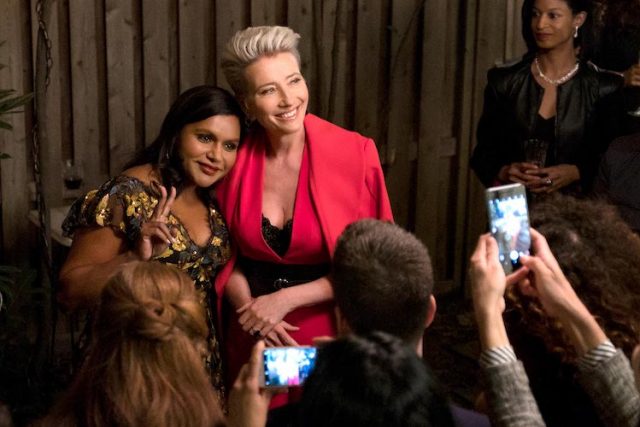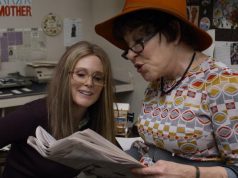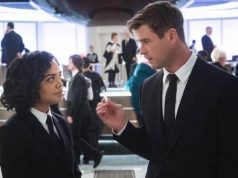
There are two things happening simultaneously for Katherine Newbury (Emma Thompson), the only female host in late night, in “Late Night,” a mild satire written by Mindy Kaling. One is that she’s being dinged for never having had a single woman on her writing staff in the 28 years she’s been doing the show. (Why is this criticism only arising for the first time now? Shut up, it just is.) The other is that Katherine has been coasting for years, the show has gotten lazy, and now the network president, Caroline Morton (Amy Ryan), wants to replace her with a hot young comic (Ike Barinholtz) in the Dane Cook mold. (Isn’t it implausible — nay, laughable — that a female network head would, in anno domini 2019, try to replace the ONE woman in late night with a generic white dude? Even if she did propose it, wouldn’t the backlash be deafening? Shut up, just go with it.)
Lucky for Katherine, both problems can be solved by hiring a female writer who’s good enough to turn the show around. She orders her producer, Brad (Denis O’Hare), to find one, and he hires the only woman who applies: Molly Patel (Kaling), a worker at a chemical plant with no experience in comedy, writing, or comedy writing who idolizes Katherine but agrees the show has gone downhill. Molly, studious and eager, brings cupcakes to work her first day and finds a chilly reception from the all-male staff, who have been using the women’s restroom to do their Number Twos, and especially from head writer Tom (Reid Scott), who’s mad that Molly was diversity-hired when he was hoping his little brother would get nepotism-hired.
Some of those details are farcical, as is the depiction of Katherine as a sharp-tongued tyrant who’s never met most of her writers and calls them by numbers instead of names. But most of Kaling’s screenplay, directed by Nisha Ganatra, sticks to something like the real world, bringing up many hot-button topics of today … and then making gentle jokes about them. Despite the righteous indignation on display about gender equality and double standards, nothing is “skewered” here; “poked meekly” would be a better way of putting it. Brad keeps urging Katherine not to get too personal on the show, lest her liberal attitudes turn off part of the audience, and I swear the movie is doing the same thing.
Eventually the real-world story gives way to sitcom-y improbability. Katherine has to change in several ways, and each of these changes comes too quickly. Six or eight lines of dialogue with a guest on her show and suddenly Katherine is empathetic and non-judgmental, to the point where the guest asks for a mid-interview hug. A third-act revelation of infidelity — unnecessary clutter to begin with, storywise — is briskly resolved. When Katherine finally tries to be authentic with her audience by making a surprise appearance at a charity show and venting, her epiphany arrives in a matter of seconds. One of the writers tells Katherine the reason she’s never hired a woman is that she hates women, and that explanation is accepted without evidence or further discussion.
This is all too bad, because Emma Thompson is (of course) wonderful, imbuing her poorly sketched character with personality and vigor, making us like her even when she isn’t nice. (Scenes with John Lithgow as her loving husband, whom she adores, help to humanize her.) The interplay among the writers — also including Hugh Dancy, Max Casella, Paul Walter Hauser, and John Early — can be energetically funny, and Kaling’s bright presence adds spirit. I wish we got a better read on her character, though; strangely, Kaling left her own role under-written, in addition to leaving so much meat on all the other bones.
C (1 hr., 42 min.; )





